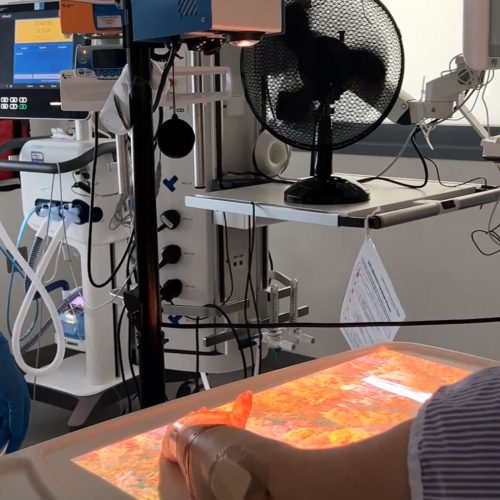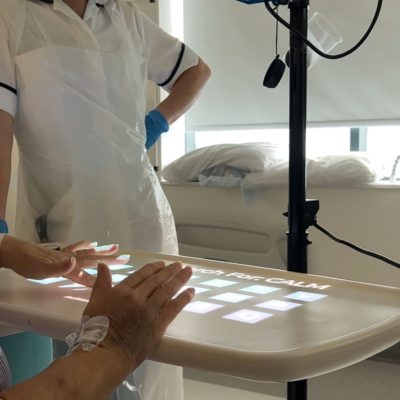University Hospital Southampton has pioneered the use of Social-Ability’s Happiness Programme delivering benefits to patients receiving critical care rehabilitation.
Critical care patients often face both physical and non-physical challenges such as muscle weakness, depression, delirium, and cognitive decline. To address some of these issues, University Hospital Southampton has implemented the Happiness Programme as part of its rehabilitation strategy. By utilising interactive technology provided by Social-Ability as part of early functional rehabilitation, the team has achieved positive outcomes. Research has shown that early rehabilitation can reduce ICU acquired delirium, length of stay and enhanced independence (Hodgson 2021).
Recognising the importance of early rehabilitation planning, the hospital has developed a comprehensive programme that prioritises the physical, cognitive, and psychological well-being of critical care patients.
At the heart of the Happiness Programme is an interactive light projector manufactured in the UK by Social-Ability. This projector engages patients in fun activities, fostering connections with staff and supporting their rehabilitation. The projector offers a wide range of games and interactive experiences, such as popping bubbles, playing the piano, colouring pictures, sweeping leaves, and engaging with virtual fish. With vibrant visuals and diverse gameplay, individuals of all ages can enjoy a safe and comfortable environment. Additionally, the projector’s portability allows it to be used wherever patients feel most at ease, whether projected onto the floor, ceiling, walls, whiteboard, or even the bed. Seasonal updates across 14 different categories ensure a constant stream of fresh experiences.
University Hospital Southampton’s has pioneered new practices in critical care rehabilitation including integrating the Happiness Programme into patient-centric care. By prioritising early rehabilitation planning, integrating diverse professional expertise, and creating a humanising environment, the hospital has been able to demonstrate sustained improvements in patient outcomes.


The Happiness Programme encourages a functional approach allowing for cognitive stimulation which has been shown to reduce cognitive impairment at 1 year post critical illness (Patel 2023). Additionally, early functional rehabilitation which may include therapies such as the Happiness Programme are well proven for reducing ICU and hospital length of stay.
John Ramsay, Managing Director of Social-Ability, expressed his delight at the success of the Happiness Programme in ICU recovery at University Hospital Southampton. This achievement further reinforces their mission to bring laughter and happiness to people’s lives. Social-Ability collaborates with innovative care providers across the UK, Ireland, and Canada, and they are thrilled to offer the Happiness Programme to University Hospital Southampton.
The Happiness Programme is a first-of-its-kind initiative helping to change the lives of people living with cognitive challenges. We use interactive light technology to provide meaningful activities for residents and patients in care homes and care settings. For more detail on what the Happiness Programme is and how it’s helping care venues across the UK, visit our getting started page.
Alternatively, jump to our dementia, learning disability, rehabilitation and NHS pages for more specific detail on how it’s helping care homes like Barchester and HC-One as well as hospitals and local authorities such as St George’s Hospital, London and Westminster and South Kensington Council.
For anything else, you can contact us here too.

Copyright © 2021 Social-ability. All Rights Reserved.